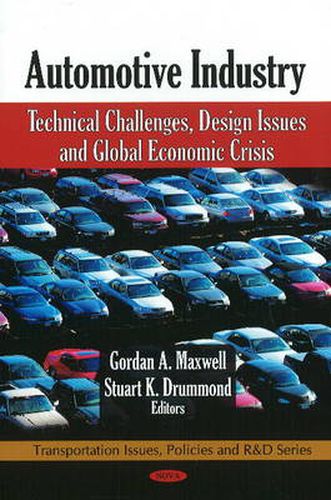Readings Newsletter
Become a Readings Member to make your shopping experience even easier.
Sign in or sign up for free!
You’re not far away from qualifying for FREE standard shipping within Australia
You’ve qualified for FREE standard shipping within Australia
The cart is loading…






This book examines how the current global economic crisis has impacted the global automotive industry from an operations and supply chain perspective. It presents an empirical and theoretical background to help long and short term planning for organisations experiencing adverse trading conditions. Material innovations in automotive technologies are also presented in this book. The contribution of materials to automobile technologies ranges over driving performance, exhaust gas purification, and improved fuel efficiency. In addition to different types of new materials, the authors discuss innovative manufacturing processes that can be used to substitute current materials in modern motorcars to enable them to meet the technical and economic challenges that the automotive industry is now facing. A new low overhead hybrid assessment method that has been designed specifically for small-to-medium-sized (SMEs) organisations is analysed. Moreover, automotive assembly plants are very unique as the variety, nature and frequencies of jobs are more extensive than those observed in other workplaces. As a result, automotive assembly workers are often exposed to major ergonomic risk factors for musculoskeletal disorders (MDD). The authors examine the aforementioned problem in terms of automotive assembly LBP prevalence, symptoms and risk factors. The role of ergonomics in shaping the evolution of the automotive assembly plant is discussed as well.
$9.00 standard shipping within Australia
FREE standard shipping within Australia for orders over $100.00
Express & International shipping calculated at checkout
This book examines how the current global economic crisis has impacted the global automotive industry from an operations and supply chain perspective. It presents an empirical and theoretical background to help long and short term planning for organisations experiencing adverse trading conditions. Material innovations in automotive technologies are also presented in this book. The contribution of materials to automobile technologies ranges over driving performance, exhaust gas purification, and improved fuel efficiency. In addition to different types of new materials, the authors discuss innovative manufacturing processes that can be used to substitute current materials in modern motorcars to enable them to meet the technical and economic challenges that the automotive industry is now facing. A new low overhead hybrid assessment method that has been designed specifically for small-to-medium-sized (SMEs) organisations is analysed. Moreover, automotive assembly plants are very unique as the variety, nature and frequencies of jobs are more extensive than those observed in other workplaces. As a result, automotive assembly workers are often exposed to major ergonomic risk factors for musculoskeletal disorders (MDD). The authors examine the aforementioned problem in terms of automotive assembly LBP prevalence, symptoms and risk factors. The role of ergonomics in shaping the evolution of the automotive assembly plant is discussed as well.